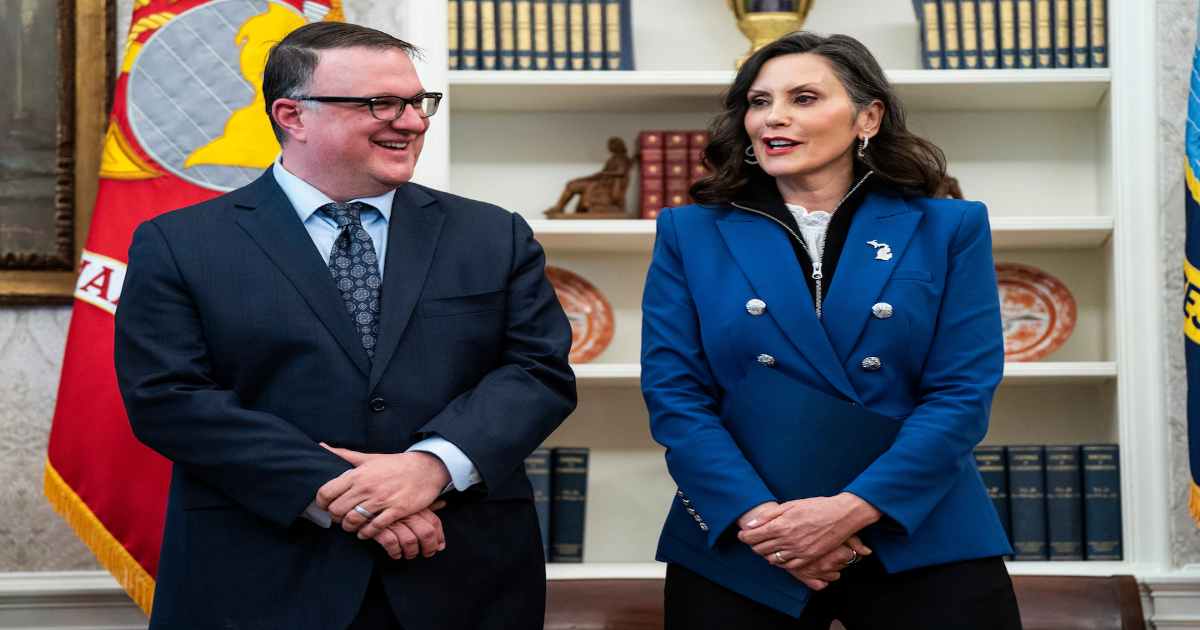Michigan Gov. Gretchen Whitmer, a potential 2028 presidential candidate, sought Wednesday to distinguish herself from fellow Democrats who have been strongly criticizing President Donald Trump and his tariffs, offering a more nuanced assessment during a speech emphasizing bipartisanship in Washington.
The speech came ahead of a meeting with Trump at the White House, her second since Trump returned to office.
Whitmer made clear that she disagreed with Trump’s sweeping and abrupt use of tariffs, saying it has been “really tough” on her state and the auto industry that powers its economy. But she withheld more pointed criticism of the president, saying she understands the “motivation” behind his tariffs and agrees that Americans “need to make more stuff in America.”
“As I’ve said before, I’m not against tariffs outright, but it is a blunt tool,” Whitmer said. “You can’t just pull out the tariff hammer to swing at every problem without a clear, defined end goal.”
Whitmer delivered her speech hours before Trump raised tariffs on imports from China to 125 percent while pausing many new levies on goods from other nations, sending the stock market surging.
Later Wednesday, Whitmer joined Trump and others in the Oval Office as he signed executive orders. He praised her leadership, saying she has “really done an excellent job,” and mentioned they were working on issues related to Selfridge Air National Guard Base, outside Detroit.
But then, illustrating the political peril for Democrats seeking collaboration with Trump, the president signed executive actions targeting two officials who served in his previous administration and opposed actions Trump had taken.
“The governor was surprised that she was brought into the Oval Office during President Trump’s press conference without any notice of the subject matter,” Whitmer’s office said in a statement. “Her presence is not an endorsement of the actions taken or statements made at that event.”
Whitmer’s remarks earlier in the day, which also included several references to working with Republicans, came at a time when polls show that many Democrats want their leaders to do more to stand up to Trump. She stood by her approach in a Q&A session with journalist Gretchen Carlson after the speech, promising to defend Michiganders’ rights but also work to ensure she has a “seat at the table.”
“I’m not going to cede the opportunity to talk about something important to my state,” she said.
Another Democrat who is considered a possible White House contender, Colorado Gov. Jared Polis, directly rebuffed Whitmer’s speech.
“The ‘tariff hammer’ winds up hitting your own hand rather than the nail,” Polis wrote on X. “Tariffs are bad outright because they lead to higher prices and destroy American manufacturing.”
Other potential White House contenders have denounced Trump’s tariffs in similarly uncompromising terms. Illinois Gov. JB Pritzker (D) has called tariffs a “Trump Tax on Working Families,” while Minnesota Gov. Tim Walz, Democrats’ 2024 vice-presidential nominee, has adopted similar language while bashing the president’s grasp of trade issues.
Trump “has been on this tariff thing forever, and every economist, conservative or liberal, will tell you they just simply don’t work,” Walz said last week on MSNBC. “We use them strategically, but he doesn’t fundamentally understand how trade works.”
Whitmer faces a more politically complex situation in Michigan, a state that Trump won twice and that is home to the United Auto Workers, the influential union whose leader, Shawn Fain, has been vocal in support of Trump’s tariffs. She spoke positively of Fain on Wednesday but said she thinks “the longer-term concern is the loss of UAW jobs and the pain that’s going to be inflicted in the short term.”
Whitmer clashed with Trump during his first term, especially during the coronavirus pandemic, but she has sought to maintain a working relationship during his second term. She first met with Trump at the White House about a month ago and previously sat next to him during a February dinner there for the National Governors Association.
During the dinner, Whitmer emphasized their shared goals of boosting manufacturing jobs in the United States while making her case about the harm tariffs could cause for automakers and other manufacturers in her state, according to people familiar with the conversation who spoke on the condition of anonymity because they were not authorized to divulge details of a private conversation. She urged Trump to keep the lines of communication open as they discussed a future meeting at the White House.
Days later, the White House announced that Trump was granting a one-month exemption on tariffs that affected imports from Mexico and Canada for some vehicles built in North America after a call with the “Big Three” automakers: Ford, General Motors and Stellantis.
Whitmer’s Wednesday speech in Washington — as well as her other travels outside Michigan — has helped fuel speculation about her White House ambitions. Asked Wednesday whether she will run for president in 2028, she replied quickly.
“No, no,” the governor said, arguing that she would have given a similar speech back home.
Maeve Reston contributed to this report.
